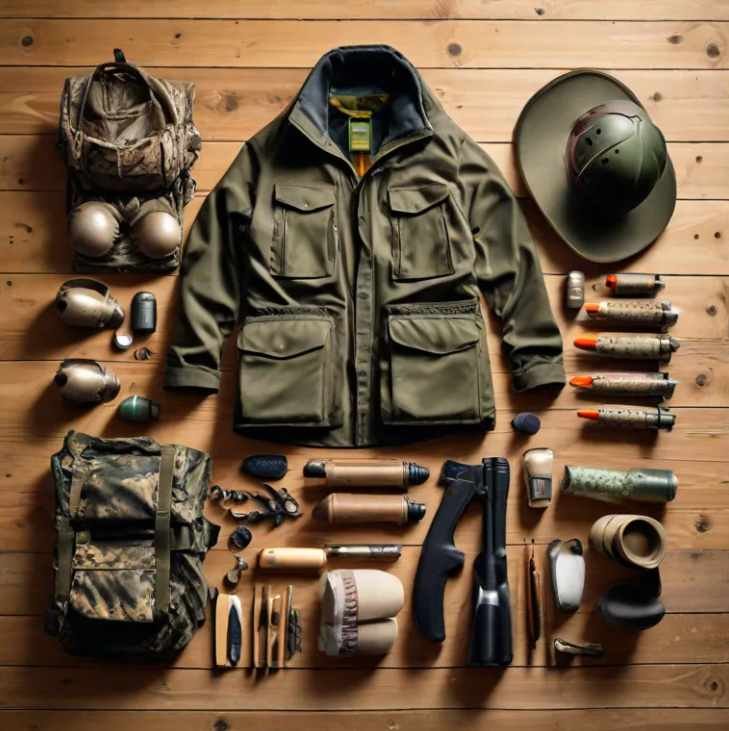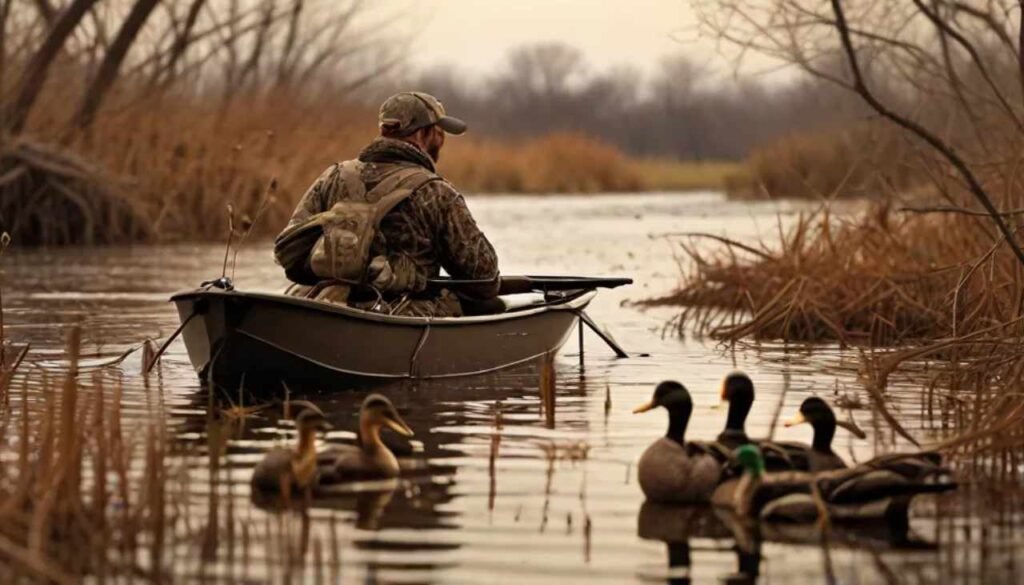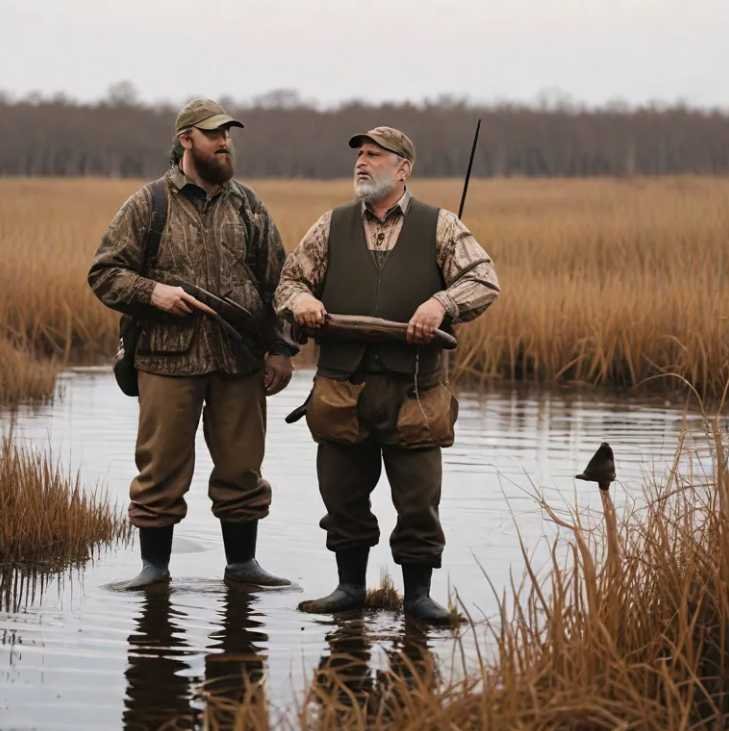Outdoor enthusiasts are drawn to the excitement of pursuing ducks time and time again. It cleverly combines a test of abilities, wait-time and admiration for the wild. If you’re new to duck hunting, this thorough handbook will provide you with the basic know-how and abilities to make your opening trip to the marshland.
Gear Up for Success: Essential Equipment for Duck Hunters
Getting a good haul hinges on your equipment’s quality. Let’s look at critical stuff you’ll need:
- Shotgun: This is key in your duck hunting kit. A 12-gauge pump-action shotgun is a beginner’s go-to for its flexibility and cost-effectiveness. Though, ponder things like kickback and weather before deciding.
- Ammunition: Opt for bullets made specifically for duck hunting. Steel shot is required by government rules in most places, so remember to look up your local laws. Shot sizes change based on the bird you aim for, with bigger shots perfect for geese.
Popular Duck Hunting Shotgun Shells
| Shot Size | Target Species | Advantages | Disadvantages |
|---|---|---|---|
| #4 | At Long Range (>40 yards) | Increased penetration power for longer shots | Less effective at close range |
| #6 | Most Common Duck Species (Mallard, Teal) | Versatile shot size for a variety of ducks | May not be ideal for geese or larger ducks |
| #7.5 | At Close Range (<30 yards) | High pellet count for maximum shot density at close quarters | Reduced range and effectiveness on longer shots |
| BB | Geese and Large Ducks | Delivers significant knockdown power for larger birds | Not recommended for smaller duck species due to overshot |
Tip: Pick shotgun shells with “high speed” or “heavy load” labels for better reach.
- Camouflage Clothing and Waders: Your gear should blend in with nature for a better outdoor session. Choose top-notch camo outfits that suit your game zone. Also, waterproof boots can keep your feet dry in damp fields.
- Decoys and Calls: Decoys copy real ducks to confuse and draw in live birds. There’s a variety, including moving, floating, and species-specific decoys. To entice them closer, these sounds imitate real duck calls. Begin with a common mallard sound and try some basic calls to improve your setup.
- Hunting Blind or Boat: A shelter hides you and shelters you from weather changes. Select a shelter with a good view that merges with the nearby plants. Or, a solid boat lets you reach far-off water spots and allows you to hunt on the move.

Duck Hunting Clothing Checklist
| Clothing Item | Description | Importance |
|---|---|---|
| Insulated Base Layer | This traps your body heat while also wicking away moisture. | Keeps your body warm when it’s cold outside. |
| Camouflage Mid Layer | It’s good for extra insulation and camouflage. | Makes sure you fit in with the environment. |
| Waterproof Waders | It keeps you dry, even in marshy areas you might have to wade through. | Helps you stay dry and cozy despite damp conditions. |
| Insulated Jacket | Helps you stay warm and shields you from rough weather. | Great for keeping your body heat steady under different weathers. |
| Camouflage Hat | It hides your head and safeguards you from the sun or rain. | Helps you stay hidden while offering comfort. |
| Insulated Gloves | It ensures your hands are warm and dry. | Shields you from the cold and lets you handle equipment with ease. |
| Waterproof Boots (for boat) | Gives you grip and keeps your feet dry on slippery boat decks. | Keeps you safe and comfy during boat hunting. |
Safety First: Essential Hunting Regulations
It is essential to familiarize yourself with the guidelines before to heading out. What you should know is as follows:
- Hunter Education and Licensing: In most states, hunters must finish a hunter education class to get a legal hunting license. These lessons teach gun safety, game principles, and wildlife control.
- Understanding Duck Species and Seasons: Learn about the different duck types in your zone and when their hunting seasons are. Bag limitations are imposed by wildlife regulations. This is the maximum number of birds you are allowed to legally capture each day.
- Firearm Safety: Safety with guns should always come first. Treat every gun as if it’s loaded, using the four main gun safety rules:
- Assume every gun is loaded.
- Don’t point a gun at anything you don’t want to destroy.
- Keep your finger away from the trigger until you’re prepared to fire.
- Be certain of your target and what’s beyond it.
If you follow these safety rules, you and others can have a safe, fun outdoor trip.
Mastering the Art of the Hunt: Scouting and Strategy
Got your gear ready? Great! Now let’s underscore some strategies for a successful game.
- Scouting and Location Selection: Essentially, scouting means finding where ducks like to move around. Search for water spots rich in food like lake greens and areas ideal for them to feed. Public grounds and places maintained for wildlife are good spots to scout.
- Understanding Duck Behavior and Habitat: Knowing all about duck habits can really up your game. Duckies are busy during early morning and late afternoon, and they like spots that are rich in food and provide shelter. It’s good to know migration behaviors and favorite spots for different duck types.
- Scouting Techniques for Beginners: Use tools like satellite pictures and wildlife forums to pin down hunted areas. Get local advice and suggestions from seasoned hunters. If you find a promising spot, pay it a visit during off-hunting times to watch their movement.
Decoy Strategies and Calling Techniques
With decoys and calls, capturing is quite successful. Let’s use them wisely:
- Setting Up Effective Decoy Spreads: Set up decoys to mimic natural duck feeding behavior. Include both drake and hen decoys, favoring more hens. Adding motion decoys can offer a real-feel.
- Mastering Basic Duck Calls: Start with easy calls like the mallard feed and hen calls. They attract ducks well. Online videos and audios can assist in improving your technique.
- Utilizing Calls Strategically: Be sparse with your calls. They may get wary if you call them too often. To keep things realistic and draw in waterfowl, use calls carefully. Try different call sequences to find your target spot’s best fit.

Let me share more advice on using duck calls right: Play with the loudness:
- Play with the loudness: Copy real duck sounds that can change in volume based on how far or close, or what’s happening.
- Train when alone: Master your calls before going out on pursuit. Keep from scaring ducks with high or fake calls.
- Learn from seasoned hunters: Watch how pro hunters use calls and mix their tricks into your game plan.
Common Duck Calls and Their Uses
| Duck Call | Description | Use Cases |
|---|---|---|
| Mallard Feed Call | High-pitched clucking sound | Attracts them to feeding areas |
| Mallard Hen Call | Soft clucking and quacking sound | Entices them to land closer and creates a sense of security |
| Pintail Whistle | Shrill whistling sound | Imitates the call of a pintail duck, often used to attract curious birds |
| Teal Whistle | Short, high-pitched whistle | Mimics the call of a teal, effective for attracting these smaller species |
| Feeding Grunt | Low, guttural sound | Simulates the feeding sounds, can encourage them to linger in your decoy spread |
Patience and Stealth: Keys to a Successful Hunt
Similar to a waiting game, it calls for composure and silence. Here’s a simple guide:
- Importance of Patience: Ducks are careful birds, so it’s crucial to be patient. Try not to make hasty actions or loud sounds that could frighten them away. Be ready to sit silently for lengthy spells, biding your time for them to get closer.
- Maintaining Proper Camouflage and Concealment: Staying hidden is critical. Just sit tight and merge with the environment. Use the green around you or a hunting cover to conceal your silhouette. Bright colors or quick movements are a no-no.
- Minimizing Movement and Noise: Every little action or noise can alarm the birds. Keep still and avoid unnecessary motion. Your talking should be soft and noise that could reveal your location should be kept to a minimum.

Beyond the Basics: Advanced Tips for Success
With experience under your belt, these expert tips might heighten your abilities:
- Retrieving Your Catch: Responsible Game Practices
- Selecting the Right Hunting Dog: Ducks are easier to retrieve with a trained dog. Retrievers, bred for this, can ably rescue fallen birds from the water.
- Proper Handling and Care of Ducks: Correct and timely field dressing keeps the meat choice. Shield harvested ducks from harsh elements until you can prep them for eating. Enhancing Your game Competence.
- Building Your Skills
- Learning from Pro Hunters: Immerse in a circle of seasoned hunters. Soak up their methods, ask, and learn. This will sharpen your skills.
- Participating in Guided Hunts: Join a respected outfitter for conducted duck pursuit. It’s a superb chance to learn from pros and discover new hunting terrains.
- Utilizing Online Resources and Forums: Internet is a goldmine for duck hunters. Sites and forums provide numerous tips, tactics, and discussions. Use these to broaden your understanding and meet fellow outdoor enthusiasts.
Conclusion
It is a fun sport that mixes craft, planning, and love for the environment. Follow the advice and methods in this guide to prepare for your first duck season. It’s an exciting event!
- Recap of Essential Beginner Tips: Remember the main points in this guide – Necessary equipment, rules, how to find ducks, the use of decoys and calls, and the need for quiet and patience.
- Responsible Hunting and Conservation Efforts: It comes with the duty to protect duck communities. Stick to hunting laws and good field habits. Maybe support organizations safeguarding duck homes to preserve this sport.
- Enjoying the Experience: Its is not just about collecting birds. It links you with nature, outdoor beauty, and the unity of other hunters.
Take on the challenge, enjoy the hunt, and savor the unique experience that comes with duck hunting. Remain persistent, and your dedication will be rewarded.
- 8 Best Trail Cameras for 2024: : Ranked, Tested, and Reviewed for Performance - September 12, 2024
- 2024’s Best Compound Bows for Beginners: Perfect Picks for New Hunters - September 10, 2024
- Top 7 Gear Essentials Every Duck Hunter Needs - July 12, 2024

